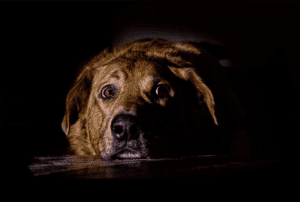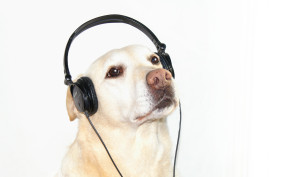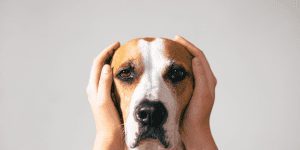Firework Night – Helping Your Dog Cope.
Bonfire night is just around the corner and while it can be tremendous fun for people, it can cause a great deal of distress for dogs. Dogs and fireworks just don’t mix well. This Holidays4Dogs article will provide a few helpful tips for dog owners, which will hopefully help worried pets through firework night.
Owners often wonder dogs can become so frightened of fireworks, or indeed any loud noises. Most animals are predisposed to being fearful of something unfamiliar and dogs are no exception. A common response to fear in dogs is to either run away (flight), or fight.
to either run away (flight), or fight.
Since it is impossible to fight and even more impossible to run away from it without still hearing fireworks, some dogs can be left in a heightened state of stress. Unfortunately, firework night in some areas can go on well before November the 5th and carry on for several days afterwards.
Some dogs learn over a period of time to be more and more fearful of fireworks. For this reason, some of our Holidays4Dogs approved carers living close to recreational areas, or parks opt out of having guest dogs to stay over the bonfire period. In more isolated areas, however, our host families can act as a refuge for firework fearful dogs.
How to help the fearful dog.
It may be helpful to embark on a programme of desensitisation and counter conditioning to fireworks, (or any noise sensitivity occurring in your dog). However, address this well out of season; during the summer months, for example. During the summer there is less likelihood of fireworks and you can therefore make progress with your dog. You will need to source a recording of fireworks – (usually available on-line in c.d. or downloadable format).
Desensitisation
This involves gradually introducing the stimulus that creates fear in the dog (the fireworks). This starts at such low volume, it does not cause a fear reaction. The dog gradually becomes used to the sound of fireworks that it becomes an unimportant noise in the background. Eventually, it will become an accepted and normal part of the dogs’ environment.
Only play the sounds when someone is in the house and able to observe the dogs’ reactions. Then, over a period of weeks and months, gradually increase the volume – anytime the dog shows fear, reduce the volume.
Counter conditioning.
Counter conditioning is a similar approach. Except this time, you are associating the feeling of fear, with something pleasurable, such as food, or a game.
Again, you need to use the recording and play the sounds on the lowest volume while the dog is eating, or playing a game. You will know if the volume is too high because the dog will refuse to eat, will stop eating, or stop playing. If necessary, play the sounds in a separate room.
You can also progress to playing the sounds at other times (quietly), while simultaneously dropping really tasty treats on the ground. Pieces of cheese, or liver, are usually very appealing to dogs.
TIP – Try and play the sounds at times when you know your dog is having fun, just before he goes for a walk, for example.
Increase the volume over a period of weeks. Be very careful not to trigger the fear response by increasing the volume too much, or too quickly. If you do observe any anxiety in the dog, immediately go back a few steps, decrease the volume right down and begin again.
any anxiety in the dog, immediately go back a few steps, decrease the volume right down and begin again.
Once the dog is able to tolerate the sounds at a normal volume, start to play it in different settings. During a car journey, for example – play the sounds randomly and at different volumes during the course of the day.
These methods, like many canine behaviour modification techniques are not quick fixes. If you feel you need further help– seek the advice of a good trainer, or behaviourist.
It is also worth checking with your vet to make sure there are no other health conditions that might be contributing to your dog’s anxiety.
General hints and tips.
Here are a few practical things you can do, to help alleviate some of the stress your dog might be feeling during the firework period.
- Comfort your dog to help reassure him. It is a myth that you shouldn’t comfort a distressed dog.
Massage is also sometimes helpful. However, NEVER tell the dog off as this is bound to create further anxiety.
- DAP diffusers are said to help some dogs who are fearful, or anxious. This synthetic chemical is a representation of the hormones a nursing bitch releases which promotes a calming bond with her puppies. Diffusers plug into a normal household socket. There are also calming aids for dogs on the market too.
- Provide your dog with a hearty meal in the evening. Consider letting him have a treat such as grated cheese, cooked vegetables, or some minced chicken. This will help him feel sleepy and relaxed.
- A couple of weeks before firework night you could set up a ‘den’ for your dog – (a crate is ideal). Try and place this away from outside walls, or windows. Cover the crate with an old blanket and provide comfy bedding and a ‘buster cube’ filled with something tasty. For better effect, prepare the den in advance, so your dog is used to going in and settling with his treat.
- Most dogs won’t take food when they are in a state of fear. However, you could try scattering a few tasty treats on the floor for him to find. This may help to distract him. Turning up the television, or radio, may also help as a distraction and to drown out the sound of fireworks.
- Don’t walk your dog during evening, or at night, when most people will be letting off fireworks – this may have to be for a couple of weeks.
Conclusion.
Bonfire and firework night seem to go on longer and louder these days. It’s an exciting time for many families, but firework is night is one event dogs do not enjoy. Some animals and pets find the whole experience very scary indeed. If your dog is particularly terrified of fireworks, talk to your vet about medication.
holidays4dogs.co.uk is a participant in a variety of affiliate advertising programs designed to provide a means for sites to earn commission fees by advertising and linking to the following websites. Read our full disclosure agreement here.



